Marisela Morales Ibáñez, Mexico’s first female attorney general, has been fearless in battling corruption since she entered the Ministerio Público (Public Ministry) in 1993. As head of the Subprocuraduría de Investigación Especializada en Delincuencia Organizada (Sub-Office for Special Investigations on Organized Crime—SEIDO), one of her first cases was to prosecute her former boss in connection with a bribery and narcotrafficking scandal in 2009.
Life repeated itself when she was appointed attorney general in March 2011 by President Felipe Calderón. Her predecessor, Arturo Chávez Chávez, was alleged to have been involved with a drug cartel as Chihuahua’s state attorney general—though the links were never confirmed.
The 42-year-old attorney general and mother of two soon discovered that some of her most formidable opponents were in her own department. By August 2012, Morales had overseen the dismissal of 272 public servants who were declared no aptos (incompetent) or caught breaking the law, and conducted some 17,360 public confidence exams designed to evaluate and certify Procuraduría General de la República (Attorney General’s Office—PGR) staff. All of this has been part of her larger project: turning Mexico’s notoriously corrupt legal bureaucracy into a modern and efficient tool to restore public confidence in the nation’s judicial system.
A year ago, Morales found herself broadsided by revelations to the north. Although she has signed important agreements with Washington, she was infuriated by the failure of the U.S. Department of Justice (DOJ) to inform her office about Operation Fast and Furious, which allowed illegal arms to fall into the hands of drug cartels.
Morales believes that her efforts will help a new generation of public servants reinvigorate Mexico’s justice system. “With the passage of time, our efforts will bear fruit,” she says. One example she is especially proud of is Proyecto Diamante (Project Diamond)—a collaboration between the attorney general’s office and the DOJ to train Mexican prosecutors and investigators in investigative techniques. The goal is to help Mexico transition to an adversarial justice system that permits cross-examination before a judge and jury. “It’s going to generate a new culture with a new system of trust,” she predicts.
Her stature and accomplishments have earned her global recognition. Soon after she was appointed, Morales travelled to Washington DC to receive the 2011 International Women of Courage Award from U.S. Secretary of State Hillary Clinton and First Lady Michelle Obama. The reward represented a double recognition—both for the work of her department and for the accomplishments of women in public life, she recalled, adding that meeting Clinton and Obama was an “unforgettable” moment: “They are two women I admire for their great intelligence, as well as for the quality of the work they carry out for their country.”
Mexico’s national government will change hands on December 1 and a new attorney general is expected to take office. But few think it will be the last that Mexicans—and the rest of the world—will hear of Marisela Morales.





